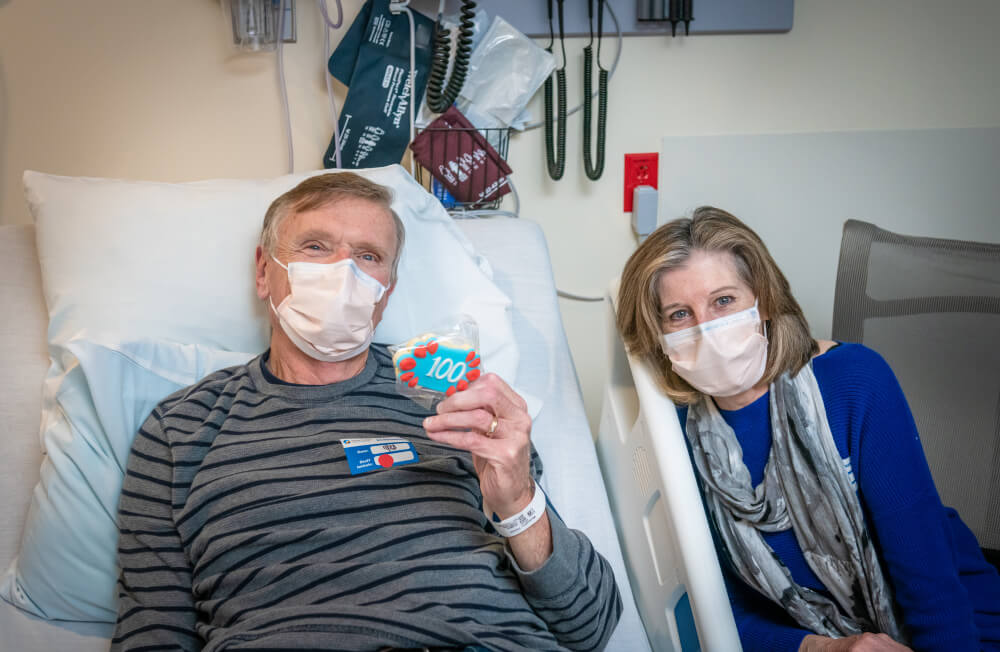Tom McLaughlin would have rather spent Thanksgiving week at home with his extended family, but under the circumstances the 76-year-old grandfather said he was very happy where he was — and still had much to be thankful for.
On November 23, McLaughlin became the 100th patient to receive an outpatient stem cell transplant at Dana-Farber Brigham Cancer Center. The procedure, which has been offered at Dana-Farber Brigham since mid-2019, allows patients meeting certain criteria to receive transplants over a series of outpatient visits rather than spend an extended stay in the hospital. McLaughlin, who is being treated for myelodysplastic syndrome (MDS), proved an ideal candidate.
Dana-Farber Brigham Cancer Center’s outpatient transplant program is the first of its kind in New England. The program is designed to reduce, or even eliminate, hospital stays for a portion of patients like McLaughlin who are set to undergo reduced-intensity conditioning. Reduced-intensity allogeneic transplants, also known as “mini” transplants, are a modified form of the procedure that uses lower, less toxic doses of chemotherapy. This makes them an ideal option for older patients, many of whom are not considered candidates for standard, myeloablative transplants — which until recent decades were the only option.
“When I started with the transplant unit in the 1990s, the average age of transplant was about 40,” says Toni Dubeau, RN, NP, the advanced practice provider for the outpatient transplant program at Dana-Farber Brigham Cancer Center. “I never could have foreseen then that we would have reduced-intensity transplants as an option, let alone that we would be transplanting people well into their 70s as outpatients.”

More control
By participating in the outpatient program, patients forgo the typical process of being admitted to the hospital for four days of conditioning chemotherapy prior to transplant, and then remaining there for up to three more weeks for the stem cell infusion and recovery. Outpatient transplantees return home after each day of preparatory chemotherapy, receive their new stem cells in the outpatient clinic, and return for follow up appointments.
Dubeau is delighted to offer older individuals — and all patients who qualify for outpatient transplants — some freedom during an extremely challenging time in their lives.
“The program has allowed people to be more active participants in their transplants,” says Dubeau. “They get to be with the people they love at night, and get to exercise and move their bodies. They are in more control over their day-to-day lives.”
Those patients who live too far to travel easily back-and-forth to their homes each night during the process often stay at local hotels near Dana-Farber Brigham Cancer Center. These hotels often include kitchenettes, which come in handy during strict post-transplant diets that don’t allow for restaurant dining.
McLaughlin and his wife Sheryl, who live about an hour’s drive from Dana-Farber Brigham, chose such an arrangement for the time in and around his transplant. Their Thanksgiving dinner may not have been fancy, but it was just what the doctor ordered.
“We were thrilled when we heard about the outpatient option,” McLaughlin, who also celebrated his 76th birthday on Nov. 26, said after his transplant. “Everybody has been so attentive and wonderful to us during the process, and we plan to have a big dinner with our family at home when the transplant team okays it.”

I had my Stem Cell Transplant March 2015 at Brigham Hospital, I too had MDS and was 71 yrs old. Living In Connecticut the outpatient procedure wouldn’t have worked for me.
I am Truly Blessed and Grateful to Dana Farber for all they’ve done for me so I can enjoy everyday with my family. Thank you to Dr Robert Soiffer and Amy Joyce for everything you’ve done and continue to do for me the past 8 yrs❤️